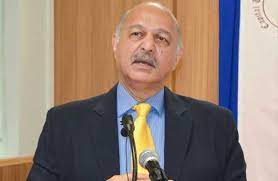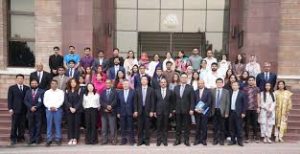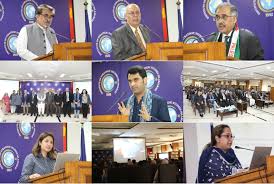BRI holds significance in context of people-centric governance: Mushahid Hussain Sayed

Islamabad. Chairman of the Senate Standing Committee on Defence Senator Mushahid Hussain Sayed has said that the Belt and Road Initiative (BRI) holds significance in the context of people-centric governance.
He highlighted that China has introduced a distinct approach to global development, emphasizing inclusivity, respect for diversity, and equality through the principles of win-win cooperation and mutual benefit.
He made this statement during his address at a webinar titled ‘Dialogue For People Centric Governance,’ organized by the Asian Institute of Eco-Civilization Research and Development (AIERD). The event was attended by various academics, diplomats, students, and senior government officials.
Senator Mushahid Hussain also mentioned that the State Council of the People’s Republic of China had recently published a white paper on the BRI, underlining its role as a key pillar of a shared community for the future.
He cited the China Pakistan Economic Corridor (CPEC) as a tangible example of this initiative.
He further explained that China’s people-centric governance is deeply rooted in the principles of the Communist Party of China and the country’s historical context. The emphasis is on serving the people, a concept that Chairman Mao Zedong had also emphasized during his leadership.
Pang Chunxue, Deputy Head of Mission and Minister at the Chinese Embassy, added to this discussion by highlighting the importance of people-centric governance in Chinese philosophy. She noted that this philosophy, deeply embedded in Chinese history, views people as the foundation of a nation. Such governance serves as a guiding principle for China’s overall development, with an emphasis on enhancing social security, healthcare, and education systems for efficient public service. Regarding CPEC, she pointed out that China had made substantial direct investments of $25.4 billion in Pakistan.
Professor Zhang Yanqiu, Deputy Dean of the Institute of Community with Shared Future, Communication, University of China, emphasized that China’s political system cannot simply be copied from other nations.
She explained the concept of “whole-process people’s democracy” in China, stating that democracy is not just a decorative element but a means to address the issues that people want to be resolved. The whole-process people’s democracy is designed to serve the interests of the people.
Shakeel Ahmad Ramay, Chief Executive Officer (CEO) of AIERD, opened the webinar by asserting that governance is an art centered on satisfying the needs of the people and serving their interests.
South African High Commissioner Mthuthuzeli Madikiza defined good governance, per the World Bank, as predictable, open, and enlightened policymaking.
He acknowledged that while the concept of good governance through representative democracy was relatively new in practice in South Africa, it was well-conceptualized. He stressed the value of diversity and acceptance of diverse ideas in democracy.
Abdul Latif Nazari, Deputy Minister of Economy in Afghanistan, discussed the country’s current situation and the commitment of the Afghan government to serve its people.
He invited all countries to participate in development projects in Afghanistan and highlighted the importance of investment in trade, agriculture, and the social sector to alleviate poverty and food insecurity.
Nazari also expressed hope that sanctions would be lifted, enabling increased interaction between Afghanistan and the world, given the country’s strategic and economic importance in the region.
Dr. Akbar Nasir Khan, Inspector General of Police in Islamabad, emphasized that progress in governance is a long-term endeavor and democracy is one way to govern people.
He highlighted the significance of diversity and acceptance of diverse ideas as fundamental values of contemporary democracy.
In conclusion, AIERD Chairman Zahid Latif Khan expressed gratitude to all participants and stressed the need for greater awareness of the Chinese governance system. He underscored that people-centric governance is vital for the well-being of the entire community and revolves around the health and welfare of individuals.
In the interconnected world, he emphasized the importance of policies that affect people’s lives, including upholding human rights, responsive government, social justice, empowerment of marginalized groups, and active participation in the decision-making process.





